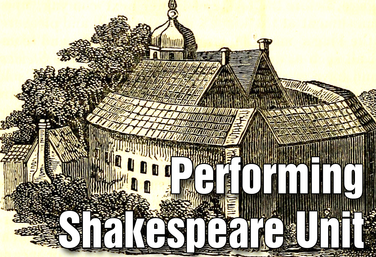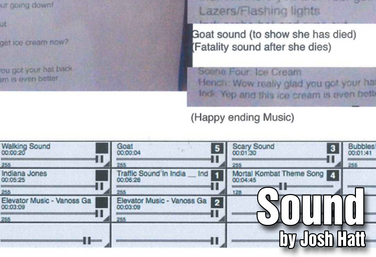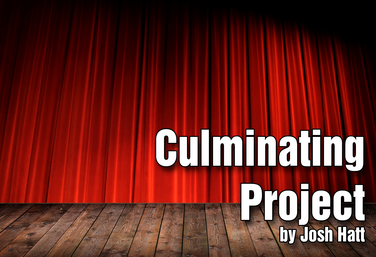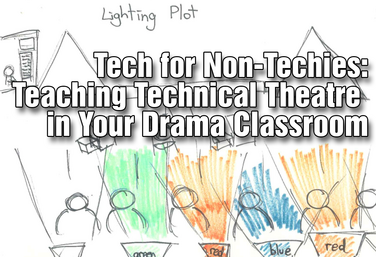View all Standards for Alberta, Canada
2 recognize the importance of illusion in sound design

UNIT
Part of the Drama Two Curriculum
Performing Shakespeare
by Matt Webster
In this unit, students are introduced to a series of lesson plans that explore non-traditional approaches to performing the works of William Shakespeare. By the end of the unit students will be exposed to a unique set of tools they can utilize as the foundations for analyzing, staging and performing a scene from Shakespeare’s canon. Students will then rehearse and perform a two-person Shakespearean scene.
Read More
about Performing Shakespeare
Read Less
about Performing Shakespeare

UNIT
Part of the Technical Theatre Mini Units Curriculum
Sound
by Josh Hatt
This is an introductory mini-unit to sound that you can use whether or not you have a sound system. Students will work toward being able to demonstrate their knowledge of sound effectiveness.
The questions of the unit include: What is effective sound? What sounds and music do we need in order to make our scene effective? How will we know our sound cues are effective?
Read More
about Sound
Read Less
about Sound

UNIT
Part of the Technical Theatre Mini Units Curriculum
Culminating Project
by Josh Hatt
Once students have completed the five Tech Theatre Units (Lighting, Sound, Costume, Staging, Free Play Makeup), you can give them this culminating project.
Depending on how you structured your technical theatre unit, you can adapt this project to suit your needs and context.
Up to this point, all the work in the units have been exploratory. This is where students will apply their skills and knowledge.
Read More
about Culminating Project
Read Less
about Culminating Project

UNIT
Part of the Stagecraft Without a Theatre Curriculum
Sound
by Karen Loftus and Josh Hatt
Students will be able to demonstrate their knowledge of sound effectiveness. How do we use sound to create a technically effective performance?
Read More
about Sound
Read Less
about Sound

UNIT
Part of the Stagecraft Without a Theatre Curriculum
Culminating Project
by Karen Loftus
Now it’s time for your students to take everything they’ve learned and creatively apply those skills. The goal is for students to take what they’ve been exposed to, explored, and researched about each of the arts and crafts of technical theatre and apply it to a project.
Read More
about Culminating Project
Read Less
about Culminating Project

PD COURSE
Concept-Based Design for the Theatre Teacher
by Matt Webster
Concept-Based Design is a method of design that allows the director and production team to create a unified world based on the ideas, perceptions and images extracted from an in-depth analysis of the play. Matt Webster designed this course for theatre teachers in a typical school setting with limited budgets, space and materials to use towards the design of their shows. Many theatre teachers feel most unsure about their design and tech skills and Matt wanted to help those teachers look at design differently, and make designing a show a little less scary and a little more fun!
Read More
about Concept-Based Design for the Theatre Teacher
Read Less
about Concept-Based Design for the Theatre Teacher

PD COURSE
Tech for Non-Techies: Teaching Technical Theatre in Your Drama Classroom
by Josh Hatt
In this course, instructor Joshua Hatt shows you how to unpack your drama standards, articulate what you want your students to know and be able to do. The material explores how to incorporate lights, sound, makeup, staging, and costuming into your drama class at any grade level regardless of your school resources or unit structure. Bells and whistles? Awesome! Barely a classroom? We’ve still got you covered.
This 9 lesson series works from the basics and standards, though lighting, sound, costuming, staging, and makeup design, and culminates with a final project including rubrics, resources, and handouts.
A wise theatre technician once said: “the theatre mirrors life but technical theatre teachers us how to live.” Try to keep that statement in mind as you work through this course and see if we can make you a believer in all things technical theatre.
Read More
about Tech for Non-Techies: Teaching Technical Theatre in Your Drama Classroom
Read Less
about Tech for Non-Techies: Teaching Technical Theatre in Your Drama Classroom
View all Standards for Alberta, Canada Standards Master List